Narmada Diary est un film de genre Documentaire réalisé par Anand Patwardhan
Narmada Diary (1995)

Si vous aimez ce film, faites-le savoir !
A Narmada Diary is a 1995 documentary on the struggle of those adversely impacted by the Sardar Sarovar Dam project. It was directed by Anand Patwardhan and Simantini Dhuru and released in the year 1995. A record from about 1990-1993, of the measures adopted and hardship faced by the Narmada Bachao Andolan movement and the people inhabiting the place affected was presented. The documentary won the "Filmfare Award for Best Documentary, 1996" and the "Grand Prize" at Earth-Vision Film Festival, Tokyo, 1996. In spite of winning the central government's national awards, the movie was not allowed to be shown on National TV
Commentaires
Postez un commentaire :
Suggestions de films similaires à Narmada Diary
Il y a 5 films avec le même réalisateur, 8962 ayant les mêmes genres cinématographiques, 1027 films qui ont les mêmes thèmes (dont 136 films qui ont les mêmes 3 thèmes que Narmada Diary), pour avoir au final 70 suggestions de films similaires.Si vous avez aimé Narmada Diary, vous aimerez sûrement les films similaires suivants :

Bombay, Our City (1985)
, 1h15Réalisé par Anand Patwardhan
Genres Documentaire
Thèmes Documentaire sur les villes
Note74%





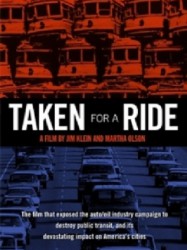
Taken for a Ride (1996)
, 55minutesOrigine Etats-Unis
Genres Documentaire
Thèmes L'environnement, Transport, Automobile, Le train, Documentaire sur le monde des affaires, Documentaire sur l'environnement, Documentaire sur les technologies, Road movie
Note78%





Taken for a Ride begins with interviews on the inefficiencies and congestion on Los Angeles' highways. Next, the film displays a variety of archival footage on streetcar systems around the United States, demonstrating that streetcars were a widespread and efficient means of transportation. The film continues into a description of the General Motors streetcar conspiracy, starting with a history of National City Lines and Pacific City Lines and General Motors' investment in both companies. The film builds the argument that streetcar systems purchased by these companies were deliberately sabotaged through service reductions and fare increases, then replaced with profitable, less convenient, bus systems. Next, the film makes a connection between this conspiracy and the construction of the Interstate Highway System and the suburbanization of America in the face of the Highway revolts in the 1960s and 1970s. The film ends with footage of the reduction of Philadelphia's trolleybus system at the time of filming.

What is the Electric Car? (2010)
Origine Etats-Unis
Genres Documentaire
Thèmes L'environnement, Transport, Automobile, Documentaire sur l'environnement, Documentaire sur les technologies, Road movie
Acteurs Fabio Lanzoni, Alexandra Paul, Ed Begley Jr.
Note71%





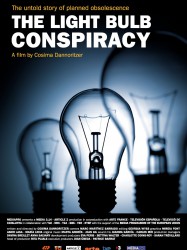 , 1h15
, 1h15Genres Documentaire
Thèmes L'environnement, La mondialisation, Le monde du travail, Documentaire sur le monde des affaires, Documentaire sur l'altermondialisme, Documentaire sur l'environnement, Documentaire historique, Documentaire sur les technologies, Documentaire sur le monde du travail
Acteurs Casey Neistat
Note79%





Un historique de cette stratégie commerciale et industrielle visant à limiter la durée de vie de certains produits ou appareils est relaté à travers plusieurs exemples particulièrement significatifs.

Up the Yangtze (2007)
, 1h33Réalisé par Yung Chang
Origine Canada
Genres Documentaire
Thèmes L'environnement, Documentaire sur l'environnement, Documentaire sur la politique, Documentaire sur les technologies, Politique
Acteurs Yung Chang
Note74%





The setting of the film is a riverboat cruise ship floating up the Yangtze river. Two young people are the focus of the film as they work aboard the ship. One is a sixteen-year-old girl from a particularly poor family living on the banks of the Yangtze near Fengdu, named "Cindy" Yu Shui. She is followed as she leaves her family to work on one of the cruise ships serving wealthy western tourists at the same time as her family is being forced from their home due to the flooding that accompanied the building of the dam. The film shows her acclimatization to the consumer economy of tourism as well as modern technology of the cruise ships, juxtaposed with her family and other older citizens who are displaced from a rural lifestyle to cities where they must pay for the vegetables they used to grow on their own.
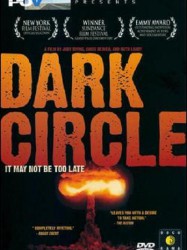
Dark Circle (1982)
, 1h22Genres Documentaire
Thèmes L'environnement, Documentaire sur l'environnement, Documentaire sur le nucléaire, Documentaire sur les technologies
Note71%





 , 1h33
, 1h33Origine Royaume-uni
Genres Documentaire
Thèmes L'environnement, Transport, Aviation, Documentaire sur l'environnement, Documentaire sur les technologies
Note64%





This documentary shows that for nearly fifty years, airline passengers and crews have been supplied with unfiltered air, called bleed air, taken directly from the engines. It shows how pressure groups have shown that this air supply sometimes becomes contaminated with neurotoxins, carcinogens and other hazardous chemicals. In aviation industry-speak this contamination is called a "fume event". Many have been reported some filling the passenger cabin with smoke and fumes.
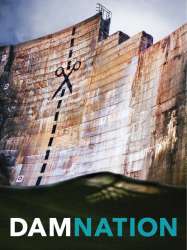
DamNation (2014)
Origine Etats-Unis
Genres Documentaire
Thèmes L'environnement, Documentaire sur l'environnement, Documentaire sur les technologies
Note74%





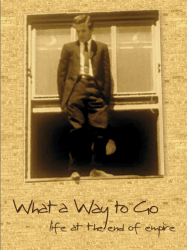 , 2h3
, 2h3Origine Etats-Unis
Genres Documentaire
Thèmes L'environnement, Documentaire sur l'environnement, Documentaire sur la politique, Documentaire sur les technologies, Politique, Film catastrophe
Acteurs Daniel Quinn
Note75%





 , 1h26
, 1h26Origine Etats-Unis
Genres Guerre, Documentaire
Thèmes L'environnement, La mer, Transport, Aviation, Documentaire sur l'environnement, Documentaire sur la guerre, Documentaire historique, Documentaire sur le nucléaire, Documentaire sur les technologies, Politique, Documentaire sur la Seconde Guerre mondiale
Note81%





Les victimes d'Hiroshima et Nagasaki racontent. Les bourreaux aussi.
 Connexion
Connexion